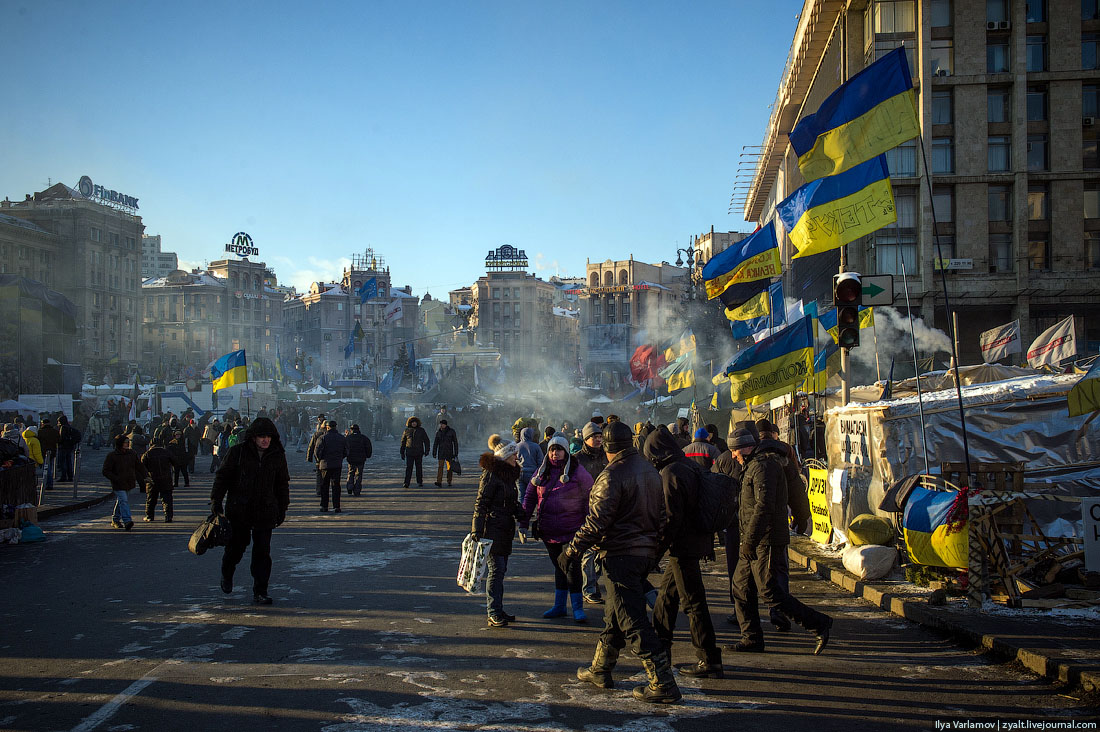What continues to amaze me is the lack of understanding among the general public and even politicians in the West that we are watching historical events evolve before our eyes.
A country of 53 million and the size of France is going through a sort of "re-birth", confirming its national identity. This sounds paradoxical when the threat of the country falling apart in two parts is not unreal; however, in fact this is part of the same process.
When Ukraine became independent in 1991, it was almost “by accident”. I remember that for many years we had to explain to people what Ukraine was, that it was not Russia and actually formed a big country with an enormous potential. Dissident friends in Moscow could not understand why I went to Kiev all the time – you could work in Ukraine just as easily from Moscow because “it is ours anyway”, right? In Amsterdam we opened a Ukrainian Information Center, with the prime task of putting the country on the map, and it turned out to be a task far from easy. People looked somewhat bewildered when you talked about Ukraine as an independent state – nobody really believed it would survive. And even some of my Ukrainian friends were somewhat weary, unsure whether the independence that fell into Ukraine’s lap was there to stay.
Because this is one of the crucial issues here: Ukraine did not have to fight for its independence in 1991, like the Baltic States – it just happened. And for more then 20 years it stumbled along, one corrupt government being succeeded by the next, usually even more corrupt one. With my eyes I not only saw the corruption, I also had to deal with it, and a lot of our humanitarian aid was stolen, misappropriated, or even sold right before our eyes. There were many reasons to loose enthusiasm for the country.
Yet now the fight is on, and it is an amazing one. A new post-Soviet generation has reached adulthood, and they are fed up with corrupt, self-enriching and incompetent rulers. What started as a protest against the decision not to sign the treaty with the EU has turned into something totally different: it is a younger generation that is waging the fight their parents did not have to wage some 23 years ago. And not only in Kiev: as a result of the violence, abductions and the use of snipers that left several demonstrators dead, the uprising is spreading across the country like wildfire, one province after the other falling into the hands of the opposition.
Western media reports on the events, but many focus on the right-wing radicals, on anti-semite “Banderovtsy” or on radicals who are against everything that smells of peace and tranquility. Yet what they forget is that these are elements on the fringes, some of them sent provocators paid to create disorder and to provide a pretext for the government to declare a state of emergency. The fact is, that the overwhelming majority of the demonstrators are young educated people who have taken on their identity as a Ukrainian and are proud of it. It is a country they love, they believe in, and they are willing to defend. As one local put it: most of the demonstrators have two degrees and speak English fluently.
And when one looks closer, one also sees a surprising ability to maintain order in the chaos. A statue close to the battlefield is covered with cloth so it will not be damaged. A shop window with luxury goods bears a note “not to take away goods in case the window breaks”. In spite of the pitched battles, that left many hundreds wounded and at least five dead, only one shop suffered major damage by fire because it was too close to the burning barricades.
One evening, after a truce was called, live streams offered a unique view of the square behind the battlefield, where hundreds of citizens moved at high speed and in organized lines to the front, carrying sacks with ice used to build barricades. From a distance they looked like ants, diligently building their defenses, a labyrinth resembling the front in Northern France during the First World War. Women set to work to chop the ice from the sidewalks so it could be used as building material, or in small “workshops” preparing Molotov cocktails to be used in case of an attack. Even disabled in wheelchairs and blind fellow citizens participated – not the typical radical anarchist only out to create havoc.
As I said, many reports in the Western media misrepresent the real situation, trying to find reasons to be critical and skeptical. Of course, this is the right of the media, even their duty, but when one forgets to highlight the other side – the historical meaning of it all – these reports become a source of irritation, even of disenchantment. In particular because virtually none of the commentators even refers to the magnitude of what is taking place, and the implications this will have far beyond the borders of Ukraine. The future of a whole region is at stake: will democracy prevail or will Putin-style authoritarianism expand further beyond the borders of Russia. Russians are watching the events in shock or in awe, or in both. What they didn’t manage at Bolotnaya Square in May 2012, their Ukrainian brothers are pulling of. It gives hem hope, and it will give them new energy if the Ukrainians will succeed. The events in Kiev are a serious crack in the Putin wall, and that right before the Olympic Games. For the ruler in the Kremlin it could not come at a worse moment.
Robert van Voren
Robert van Voren is a Sovietologist teaching at Vytautas Magnus University in Kaunas and Ilia State University in Tbilisi. He was Permanent Representative of Ukraine in the Benelux for Humanitarian Affairs in 1994-1997.



